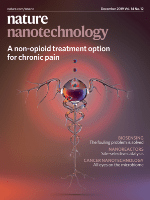
Nature Nanotechnology
Scope & Guideline
Transforming Ideas into Nanoscale Solutions.
Introduction
Aims and Scopes
- Nanomaterials and Nanostructures:
Research on the synthesis, characterization, and application of nanomaterials, including metals, semiconductors, and biomaterials, focusing on their unique properties at the nanoscale. - Nanomedicine and Therapeutics:
Exploration of nanotechnology in medical applications, including drug delivery systems, diagnostic tools, and therapeutic strategies aimed at improving health outcomes. - Nanoelectronics and Photonics:
Development of nanoscale electronic and photonic devices, investigating how nanoscale phenomena can enhance device performance and functionalities. - Environmental and Sustainable Nanotechnology:
Studies addressing the environmental impact of nanomaterials and the development of sustainable nanotechnology solutions for energy, catalysis, and pollution remediation. - Quantum and Topological Nanostructures:
Research on quantum phenomena in nanostructures, including topological insulators and their potential applications in quantum computing and information processing.
Trending and Emerging
- Smart Nanomaterials and Responsive Systems:
There is a significant increase in research focused on developing smart nanomaterials that can respond to environmental stimuli, enhancing their functionality in applications such as drug delivery, sensors, and environmental remediation. - Nanotechnology for Sustainable Energy Solutions:
Emerging studies are increasingly focusing on the role of nanotechnology in renewable energy, including solar cells, energy storage systems, and catalytic processes for carbon capture. - Personalized Nanomedicine and Targeted Therapies:
Research aimed at customizing nanomedicine approaches for individual patients is rapidly growing, particularly in cancer treatment, where targeted delivery systems are being optimized. - Integration of Artificial Intelligence in Nanotechnology:
The application of AI and machine learning in the design, synthesis, and characterization of nanomaterials is emerging as a significant trend, enhancing the efficiency of research and development. - Quantum Technologies and Information Processing:
There is a growing focus on the development of quantum nanostructures and devices that leverage quantum properties for applications in computing, cryptography, and communication.
Declining or Waning
- Classical Materials Engineering:
Research focused on traditional materials engineering approaches (e.g., bulk material properties) has seen a decline as the focus shifts towards nanoscale phenomena and applications, which offer more innovative solutions. - Conventional Drug Delivery Systems:
The exploration of traditional drug delivery methods is decreasing as interest grows in novel nanocarrier systems that enhance specificity and efficacy, particularly for personalized medicine. - General Nanotoxicology Studies:
While the safety of nanomaterials remains important, the volume of general studies on nanotoxicology has decreased, with a shift towards more specific and mechanistic investigations. - Static Nanostructure Analysis:
Research that primarily focuses on static properties of nanostructures is declining, with a growing emphasis on dynamic behaviors and real-time applications. - Broad-spectrum Biomedical Applications:
Research that lacks specificity in biomedical applications is declining as the field moves towards targeted therapies and precision medicine strategies.
Similar Journals
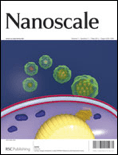
Nanoscale
Pioneering Discoveries in Materials Science.Nanoscale is a premier academic journal published by the Royal Society of Chemistry, dedicated to advancing the field of nanoscience and nanotechnology. With both its ISSN (2040-3364) and E-ISSN (2040-3372) ensuring wide accessibility, the journal is renowned for its high-impact research contributions, reflected in its impressive 2023 Impact Factor and prestigious Q1 ranking in both Materials Science (Miscellaneous) and Nanoscience and Nanotechnology categories. Since its inception in 2009, Nanoscale has fostered a collaborative platform where leading researchers from around the globe share their innovative findings across a multitude of topics spanning from material synthesis to applications in nanotechnology. The journal not only serves as a valuable resource for professionals, researchers, and students but also actively engages the academic community in discussing emerging trends, thus shaping the future of nanoscience. Situated in the heart of the UK at Thomas Graham House, Science Park, Milton Rd, Cambridge CB4 0WF, Nanoscale remains a key publication for those looking to keep abreast of the latest breakthroughs in an ever-evolving field.
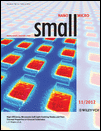
Small
Advancing Knowledge in Small-Scale Innovations.Small is a premier academic journal published by WILEY-V C H Verlag GmbH, focusing on cutting-edge research across a multitude of disciplines including biomaterials, biotechnology, chemistry, engineering, materials science, medicine, and nanoscience. With an impressive impact factor and recognized in the top quartile (Q1) across these categories, Small serves as a vital platform for scientists and researchers aiming to disseminate innovative findings and explore the interplay between small-scale materials and their large-scale applications. Enjoying a broad readership, the journal has been key in advancing knowledge from its inception in 2005 and aims to foster collaborations and discussions that steer the future of material science and biotechnology. Though not open access, research published in Small remains invaluable for professionals and students eager to explore the advancements at the nanoscale, promoting a comprehensive understanding of modern scientific challenges and opportunities.

Nanotechnology and Precision Engineering
Connecting global minds in the realms of nanoscience and engineering.Nanotechnology and Precision Engineering is a leading open access journal published by AIP Publishing, dedicated to advancing the fields of nanotechnology and precision engineering. Established in 2006, the journal has become a vital resource for researchers, professionals, and students, reflecting the latest advancements in Electrical and Electronic Engineering, Industrial and Manufacturing Engineering, Instrumentation, Mechanical Engineering, and Nanoscience. With an impressive variety of quartile rankings in Scopus—notably Q1 in several key engineering domains—the journal provides a robust platform for disseminating groundbreaking research. Noteworthy aspects include its open access format introduced in 2018, ensuring that high-quality research is freely accessible to a global audience. By maintaining a commitment to excellence and collaboration, Nanotechnology and Precision Engineering plays a crucial role in shaping the future of technology and innovation.
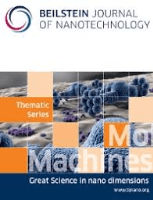
Beilstein Journal of Nanotechnology
Innovating at the intersection of science and technology.The Beilstein Journal of Nanotechnology is a prominent open access journal published by the Beilstein Institute that has been at the forefront of nanotechnology research since its inception in 2010. With a focus on cutting-edge developments in areas such as Electrical and Electronic Engineering, Materials Science, and Physics and Astronomy, this journal is ranked in the Q2 category across multiple scientific disciplines, reflecting its significant impact within the research community. The journal is accessible to a global audience and aims to foster innovation and application of nanotechnology across various fields. Featuring a rich convergence of interdisciplinary studies, the Beilstein Journal of Nanotechnology offers a platform for researchers to share their findings, thus advancing the frontiers of knowledge in this dynamic field. With publishers based in Frankfurt am Main, Germany, it continues to contribute to the scientific dialogue on nanoscience and its practical applications, making it an essential resource for academics, professionals, and students eager to stay at the cutting edge of technology.

Advances in Nano Research
Unveiling the Potential of NanomaterialsAdvances in Nano Research, published by TECHNO-PRESS, is a prominent academic journal dedicated to advancing knowledge across various facets of nanoscience and nanotechnology. With its ISSN of 2287-237X and E-ISSN 2287-2388, this journal serves as a vital resource for researchers and professionals, focusing on areas such as Atomic and Molecular Physics, Biotechnology, Catalysis, Ceramics and Composites, and Electrical Engineering. Since its inception in 2017, the journal has notably achieved Q2 ranking in multiple categories for the year 2023, reflecting its commitment to high-quality research dissemination and its increasing influence in Scopus rankings, including ranks within the top 12% in Chemical Engineering. While Open Access options are currently unavailable, the rigorous peer-review process ensures that only the most impactful studies are published, further solidifying its importance within the academic community. As a significant player in the fields of engineering and materials science, Advances in Nano Research aims to foster innovation and collaboration, making it an essential publication for those engaged in cutting-edge research and development within the realm of nanotechnology.
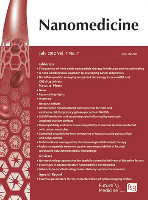
Nanomedicine
Unlocking New Frontiers in Biomedical EngineeringNanomedicine, published by Future Medicine Ltd, is a premier academic journal dedicated to the rapidly evolving field of nanotechnology in medicine. With an emphasis on innovative research and applications, this journal encompasses a broad spectrum of topics including bioengineering, biomedical engineering, and nanoscience, among others. Featuring an impressive Q1 ranking in Development and multiple Q2 rankings across significant categories, it serves as a pivotal resource for researchers and professionals aiming to stay at the forefront of advancements in these disciplines. While the journal is not open access, it is accessible through various institutional subscriptions, ensuring wide dissemination of cutting-edge findings. Notably, it has achieved substantial impact within the scientific community, indicated by its high rankings in Scopus and overall commitment to enhancing the understanding and application of nanomedicine. This journal is a vital conduit for fostering collaborations and innovations that transcend traditional medical paradigms.

Nano Research
Elevating knowledge in the realm of nanotechnology.Nano Research, published by TSINGHUA UNIVERSITY PRESS, is a prestigious academic journal dedicated to advancing the fields of nanoscience and nanotechnology. Since its inception in 2009, the journal has established itself as a leading platform for the dissemination of high-quality research, evidenced by its impressive Q1 rankings across multiple categories including Atomic and Molecular Physics, Condensed Matter Physics, and Electrical and Electronic Engineering. With an impact that resonates globally, Nano Research not only attracts contributions from renowned researchers but also appeals to students and professionals striving to stay at the forefront of innovation. The journal’s commitment to excellence is reflected in its ranking, placing it in the top echelons of its field, as evidenced by its notable Scopus standings. Researchers can benefit from its rigorous peer-review process and broad scope, encompassing theoretical, experimental, and applied studies. For those passionate about pushing the boundaries of knowledge in the realm of nanotechnology, Nano Research serves as an indispensable resource.

Physical and Chemical Aspects of the Study of Clusters Nanostructures and Nanomaterials
Pioneering Insights into Clusters and NanomaterialsPhysical and Chemical Aspects of the Study of Clusters, Nanostructures, and Nanomaterials is an esteemed open-access journal published by TVER STATE UNIVERSITY, dedicated to advancing the scientific discourse surrounding the intricate interplay of physical and chemical properties in nanostructure materials. Launched in 2017, this journal provides a vital platform for researchers, professionals, and students to disseminate and access cutting-edge findings in the rapidly evolving fields of nanotechnology and materials science. With an ISSN of 2226-4442 and an E-ISSN of 2658-4360, it aims to bridge the gap between academic research and practical applications. By facilitating open access to high-quality research, the journal plays an essential role in promoting innovative solutions to contemporary challenges in engineering, materials development, and related industries. The journal's scope includes but is not limited to the synthesis, characterization, and functionalization of nanomaterials, ensuring comprehensive coverage of this multidisciplinary field.

Nanoscale Research Letters
Shaping the future through nanoscale discoveries.Nanoscale Research Letters, published by SPRINGER, is a leading open-access journal dedicated to the rapid dissemination of innovative research in the field of nanoscience and nanotechnology. Established in 2006, this journal provides researchers and professionals with a platform to share their groundbreaking findings across a broad spectrum of applications, including condensed matter physics and materials science. With an impressive Q1 ranking in both Condensed Matter Physics and Materials Science categories as of 2023, it asserts its position as a top-tier publication within the scientific community, bolstered by a 96th percentile rank in the Scopus database. Nanoscale Research Letters not only emphasizes the importance of nanotechnology research but also ensures that its findings are widely accessible, adhering to its open-access mandate. Scholars and students alike are encouraged to contribute to and engage with this dynamic resource, fostering collaboration and innovation in the ever-evolving world of nanoscience.

Micro and Nanostructures
Pioneering Research in Micro and NanotechnologyMicro and Nanostructures is a leading academic journal published by Academic Press Ltd - Elsevier Science Ltd, focusing on the cutting-edge fields of biomaterials, condensed matter physics, and electronic, optical, and magnetic materials. With an impact factor reflecting its rising status, the journal has achieved remarkable rankings within its categories, including Q2 in Condensed Matter Physics and Electronic, Optical and Magnetic Materials, and Q3 in Biomaterials, as of 2023. Spanning from 2022 to 2024, Micro and Nanostructures presents integral research that advances the understanding and application of micro- and nanostructured materials, thereby playing a crucial role for researchers, professionals, and students alike. As an open access publication, it ensures broad accessibility to groundbreaking studies that shape the future of material science. The journal's commitment to high-quality research and its strategic positioning as a premier source of knowledge in its domain make it an essential platform for the dissemination of innovative ideas and discoveries.